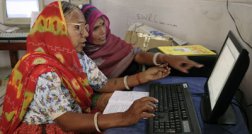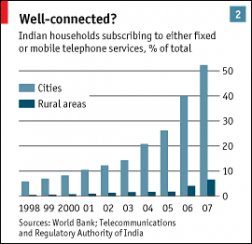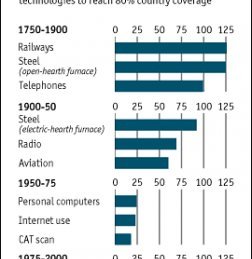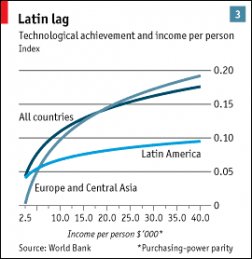 WITHIN a few months China will overtake America as the country with the world's largest number of internet users. Even when you factor in China's size and its astonishing rate of GDP growth, this will be a remarkable achievement for what remains a poor economy. For the past three years China has also been the world's largest exporter of information and communications technology (ICT). It already has the same number of mobile-phone users (500m) as the whole of Europe.
WITHIN a few months China will overtake America as the country with the world's largest number of internet users. Even when you factor in China's size and its astonishing rate of GDP growth, this will be a remarkable achievement for what remains a poor economy. For the past three years China has also been the world's largest exporter of information and communications technology (ICT). It already has the same number of mobile-phone users (500m) as the whole of Europe.
China is by no means the only emerging economy in which new technology is being eagerly embraced. In frenetic Mumbai, everyone seems to be jabbering non-stop on their mobile phones: according to India's telecoms regulator, half of all urban dwellers have mobile- or fixed-telephone subscriptions and the number is growing by 8m a month. The India of internet cafés and internet tycoons produces more engineering graduates than America, makes software for racing cars and jet engines and is one of the top four pharmaceutical producers in the world. In a different manifestation of technological progress, the country's largest private enterprise, Tata, recently unveiled the “one lakh car”; priced at the equivalent of , 500, it is the world's cheapest. fish prices and find the best market for their catch.
fish prices and find the best market for their catch.
Yet this picture of emerging-market technarcadia is belied by parallel accounts of misery and incompetence. Last year ants ate the hard drive of a photographer in Thailand. Last week internet usage from Cairo to Kolkata was disrupted after something—probably an earthquake—sliced through two undersea cables. Personal computers have spread slowly in most emerging economies: three-quarters of low-income countries have fewer than 15 PCs per 1, 000 people—and many of those computers are gathering dust.


- Texas apostille. Birth certificate apostille. Apostille services.






